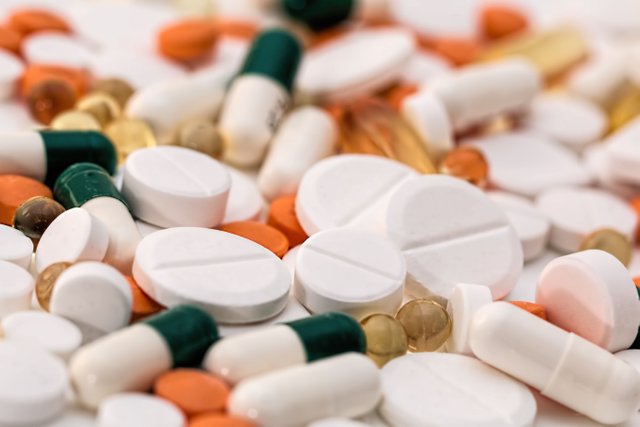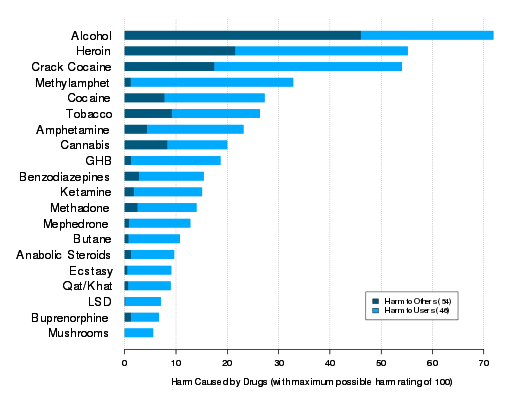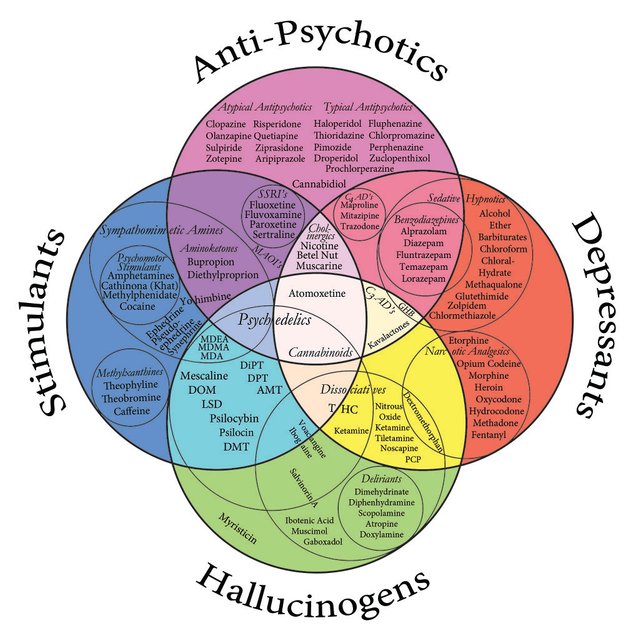How Law Influences Our Thinking Patterns About Drugs

On a Helsinki Metro magazine's text message section, people had gotten active on discussing drugs. Apparently they had been featured on the media, or so I deducted since I hardly follow any news, except the Metro magazine from time to time not even that anymore.
It was quite upsetting, the quality of the comments, but in no way could I say I was surprised on the attitudes that the messages projected.
Though I cannot blame it all on people since our society has a big part on shaping our perception about drugs and their users.
And a vicious cycle is ready.
NOTE!
Continuing from here, everything will be from a point of view of me living in Finland, and its laws, so keep that in mind while reading.
Here's some concepts that need some specifying:
In English, drugs commonly refers both to recreational drugs and medicine. But I'll talk medicine as medicine or pharmaceutical, and drugs as recreational drugs and such so you know what I'm talking about.
Then there's psychotropics which includes all the substances that across the blood-brain barrier (a system that controls which substances can enter the brain). Could also be called as psychoactive substances.
These concepts are much more distinctive in Finnish (the original language I wrote this article).
In everyday life there seems to be 3 rough categories in which different substances fall into based on their legal status and availability:
- Drugs (illegal intoxicants)
- Legal intoxicants, like alcohol ie. ethanol.
- Medicine (usually aren't referred as 'intoxicants' but are intoxicating when abused).
These categories give a frame of reference on how to relate to them:
- Drugs: usage, possession and selling is illegal and punishable.
- Legal intoxicants: allowed with certain regulations (alcohol and nicotine products commonly with age restriction of 18 years). Alcohol is an integrated part of many cultures and banning it has been unsuccessful in many countries.
- Medicine is supposed to heal you or at least alleviate the symptoms.
But the problem is that the legal, or rather, "social status" in itself doesn't really tell us anything about the quality of the substance but of its social acceptance which isn't a guaranteed way to measure utility.
Sometimes laws are made in a hurry with insufficient data hence they don't always reflect or provide actual usefulness.
When psychoactive substances are examined based on their attributes and effects we can organize them all by using four dimentions:
stimulants
depressants
hallucinogens
antipsychotics
On the picture down, different psychoactive substances are categorized using the 4 dimensions. But as you can see, the dimensions aren't independent slots but they overlap with each others creating secondary and tertiary groups.
By Georgelazenby [CC BY-SA 3.0 or GFDL], via Wikimedia Commons
My idea was to show that the difference between medicine and drugs might not always be as clear, and in some cases seems rather arbitrary. Some medicine have similar influence compared to drugs and they might even take its role. Buprenorphine, for example, was originally and still is used as a substitute medicine for narcotic addicts but has since spread to illegal markets also. Even though it has a ceiling effect beyond which the drug's effect doesn't increase after increasing the dose, it causes a lot deaths when misused with alcohol. Also, US. is suffering from opioid crisis, caused by the increased miss-usage and lethal overdosing of opiate based prescription medicine.
People are dying to medicine that doctors are prescribing.
Another epidemic creeping right behind opioid crisis (at least in the US. as I've understood) is the abusing of amphetamine based medicine which are used to treat attention deficit disorders.
In some highly competitive field of education, some students feel the pressure to take every possible edge and abuse focus enhancing products such as Adderall to excel with better grades. Even more worry-some is that some parents in their ignorance might get their kid to a doctor just because she/he doesn't get straight A's, only to unnecessarily be described with AD(H)D medication, without the parents even thinking about the long-term consequences these compounds can have.
Here's a former addict with methamphetamine by his drug of choice talking about Adderall:
Today's drug policies are almost entirely based on two conventions: Single Convention on Narcotic Drugs, 1961 and Convention on Psychotropic Substances, 1971
These would deserve their own posts but it's good to disclose them to get a some percpective.
My biggest problem when people talk about "drugs" is that it's vague in its meaning and it doesn't really tell us anything else than about the word itself: illegal intoxicant, forbidden, punishable and destructive for an individual and society. What we manage to do when talking about various compounds as a single unit of "drugs", is create nothing but a general fused idea that refers to nothing concrete.
All the different compounds should be evaluated individually based on the dangers and potential medical advantages.
Education
In high school I was a bit disappointed by psychology books. They talked about the SSRIs, that they inhibit the reuptake of serotonin in the nerve cell synopsis in the brain. But telling about LCD, all that was said was along the lines of "can lead to trauma, PTSD, even psychosis".
Why? What's going on in the brain under the influence of LSD?
Of course this can happen when people don't know what kind of a substance they're dealing with. It's not just about sensory hallucinations, it puts your brain's cognition upside down: unusual communication takes place between different parts of the brain, in high doses potentially even leading to losing the sense of one's self which can feel like dying at worst. Not to mention that what you get on the streets could be anything but the substance you bought into. This is common especially with ecstasy with other substances like PMA (para-Methoxyamphetamine) and bathsalts thrown into the mixture sometimes leaving no room for MDMA (the effective compound in ecstasy) at all.
Decriminalization
In US., some states have legalized cannabis and I think the trend is inevitable to continue.
But, of course, if humans are provided with more freedom to have an option to use different substances having more responsibility over themselves, they need knowledge so they can make calculated decisions on their own.
That's why open discussion and education is essential when moving towards increasingly decriminalized drug policies which I see as a reality in the future, so we'd better start thinking how we can do it right instead of sitting on our asses reacting to the problems instead of thinking ahead.
We're starting to talk about sex on the TV (like sometimes) but good God if you happen to mention some illegal intoxicating substances you will become the root of all evil next to the throne of Satan.
Why aren't the effects and addiction mechanisms talked about? Almost everyone is addicted to something, some to their cellphone, some to a chemical compound of their choice. Yet few understand how our brain work and form these compulsive behaviors.
It's not even that hard to explain. Let's just take meth as an extreme example: Using meth brings you the best pleasure for 24 hours that can be experienced. But the consequences of frying your brain with too much dopamine is losing the satisfaction from regular life activities when your brain gets accustomed to this new threshold that is WAY over the limits than what nature intended. The high is so powerful that even keeping yourself alive isn't as attractive as the substance anymore. It's that powerful with hijacking your pleasure centers.
Punishments over the possession of small amounts for personal use should be terminated.
Drug DECRIMINALIZATION IN PORTUGAL, Lessons for Creating Fair and Successful Drug Policies
Picked from the PDF:
The data show that, judged by virtually every
metric, the Portuguese decriminalization framework
has been a resounding success.
You see, some of the drugs have a high chance of ruining your life. They consume and enslave you for the single purpose of needing more. I agree that such compounds shouldn't be available just by walking up to a shop on a street and that is not the point of decriminalization.
The point of decriminalization is to stop punishing people because it doesn't help them get over their addiction.
Handing out "drugs" for people sounds counterintuitive – "supporting junkies" – but the fact is that the nature of addiction doesn't leave a choice but to pursue given drug no matter what. And while doing so on the streets, one risks taking substances that have no guarantee on the actual compounds.
Not all drugs are equal.

By User: Tesseract2 [CC BY-SA 3.0], via Wikimedia Commons
Here's the research
It should be said that the study doesn't take the legal status of substances into account.
In my workplace I saw a similar kind of study but what was research was "How big of a percentage of a substance x users have ended up needing professional help?" I do not remember whether it was just Finland specifically but the pattern of the chart looked quite similar with mushrooms on the bottom with mushroom users under 1% for the need of medical help, and alcohol at the top.
Psychedelics are a strange anomaly: they don't have any guaranteed results despite media and education having painted a picture of using them to always end up with trauma. While it's true that it can happen (a lot of the times as a result of ignorance because of illegal status), at the same time the potential upsides seem to be neglected – cannabis with pain relieving and psilocybin mushrooms with relieving depression.
What also is hugely important with psychedelics is the setting: the surroundings and the mental state in which a psychedelic substance is consumed.
Everyone has a unique experience and response to, not only psychedelics, but to any drug, with people having different inclinations to which they are more likely to become addicted to.
The difference between a drug and medicine could be only as thin as the intended way of consumption: recreational vs. medicinal. And this definition can change as quick as handing the substance from a drug dealer to a doctor.
I believe the fear towards psychedelics stems from not understanding the mind and I think we have ignored the exploration of it, now rediscovering it with the introduction of mindfulness, for example, in western cultures which is basically Eastern philosophy repackaged understandably for western people.
How it would be in practice
In Netherlands there are Coffee Shops and Smart Shops where you can get some "mild drugs" like marijuana and psilocybin truffles. Looking at some webpage they were doing exactly as they should: not only selling their product but also informing how to safely consume psilocybin to reduce the risks for bad experiences. It's the same as is with alcohol already: people are told about the risks and how to consume responsibly.
Of course, the marketing of cannabis or mushrooms would likely be banned, and that's fine. Any psychoactive substances wouldn't be plied under our noses, but those interested would have a way to acquire these substances without endangering themselves.
Few! This took way too long to do, but it's finally up there. Feel free to throw comments either about my poor argumentation, my potential ignorance on something or just about you needing to hide your cannabis plantations (hopefully that'll change).
Thank you!

Holy crap! Informative for sure and I feel things are not so different in Canada.
Reminds me of the conversation I had with my daughter yesterday when she asked me why the government is decriminalizing marijuana. I can't let he know I smoke from time to time and had to explain how it is medicine for some, alchohol really is a larger societal problem, and people should not be put in jail or laced with criminal records because they are caught with a joint.
She also knows about Michael Jackson (school project so she thinks she is an expert ;) and hopefully gets the picture about prescription drug addiction.
Anyhow, loved the post! More!
I'm seriously glad you liked it because structuring this and juggling with two languages (I made this in Finnish too) took so much of my unorganized brain power that I don't know when, if ever, I'm going to get the desire to make something like this again.
Thanks for always digging @zekepickleman!
Ah my pleasure you produce such great stuff whether it is huge and really structured and informative, or simple and entertaining.
To be honest all drugs should be legal. Let the natural selection do its job.
Haha, good old "Darwin way".
God I really love the hardliners sometimes ahahaha
Amazing dig into the truth about drugs!
Thanks to @paradigmprospect, this post was resteemed and highlighted in today's edition of The Daily Sneak.
Thank you for your efforts to create quality content!
What a pleasant surprise! Thanks for featuring me, and thanks @paradigmprospect for the curation :D
This post was shared in the Curation Collective Discord community for curators, and upvoted and resteemed by the @c-squared community account after manual review.
very educational and packed with information that surely benefits readers.. thanks for sharing this to us
Glad you liked it.